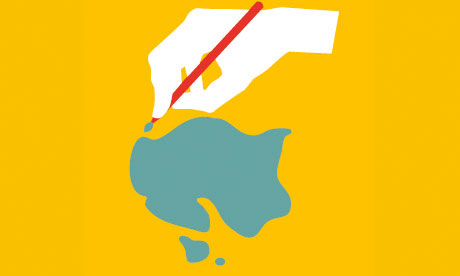
Children know how to throw themselves into a state of freewheeling adventure, cantering after curiosity simply for the joy of it. They lose hours to happy experiment pushing a sea of paint around a page or studying the creatures in a patch of grass. Even a tedious wait at a bus stop offers intrigue: where adults see a dull lump of concrete, they spy an asteroid teeming with sci-fi potential. Having nothing in particular to do gives kids space for their imaginations to bloom. For adults, it can fill us with anxiety.
Growing up, we learn to put play aside and earn it as a reward for hard work. We dream of how liberating free time will be, and work harder to buy more of it. Along the way, our sense of permission to play becomes tangled up with the demand to be productive and the ticking of the clock. When free time finally arrives, we fear we're not making enough of a precious commodity. We seek proof we're getting something out of it – an impressive snapshot, a great story, a deep tan. But the desire for results is precisely what stops us having a good time. It reduces us to standing outside our own experience like an examiner with a checklist, assessing its worth rather than fully living in the moment.
How can we enjoy free time more? First, we can try to liberate it from the need to be productive. One way is to take pleasure in the challenge of doing something just for its own sake, regardless of results. Here's an example. When we want to capture a moment we reach for a camera. But a photograph can too easily become a substitute for the larger memory it was intended to protect.
No doubt that's why the Victorian thinker John Ruskin chose to champion drawing just when photography seemed to be surpassing its results. For him, the vitality of drawing was in its process. He would tell his students he was not teaching them to draw. "I am only trying to teach you to see." And, by seeing, to absorb and carry away "images of beauty" that enrich the rest of life. So let's expand our experience through the pleasures of close observation, and take up the pencil without caring what we show for it.
Another barrier to enjoying free time is the numbing effect of its endless potential. We share the horror vacui of the artist facing the blank page, struggling to give shape to its formlessness. In response, we might borrow a trick Robert Louis Stevenson used to begin Treasure Island. He drew a map of the island first – a channelling of options that set his ideas flowing. We, too, could devise creative rules and experiments for ourselves.
In this spirit, the author Georges Perec wrote a portrait of the objects on his desk and tried to find a route to cross Paris using only streets beginning with the letter C. One of his exercises took inspiration from Gustave Flaubert reimagining his home city: "Paris will become a winter garden; fruit trees on the boulevard," wrote Flaubert. The houses will glow with a "phosphorescent substance, and the radiation will light the streets". Like Perec and Flaubert, we might abandon an hour to whimsy, creating fantastical ideas from familiar scenes.
Perec used what was to hand, deepening his appreciation of the marvels that lie hidden among the stuff of daily life. This is a form of curiosity that the philosopher Walter Benjamin celebrated as the way to "discover the world in which you already live". It's a state of attentiveness the poet Stevie Smith explored when listening through her open window in the suburbs for "the unconscious poem that happens sometimes when people are talking". We, too, can collect fragments and sleuth for creative clues among our surroundings to spark our reverie and fuel our adventures.
In the process we can overthrow the idea that we need money and distant travel to enjoy free time. We can explore creating our own pleasures rather than buying them off the shelf. Free time might thus become less a commodity and more a state of being. By taking time to pursue what catches our imagination, by slowing down and noticing the texture and detail of life, we can start to find out what really fascinates us.
• Cathy Haynes is a founding faculty member and the curator of public programmes for The School of Life. cathyhaynes.org

